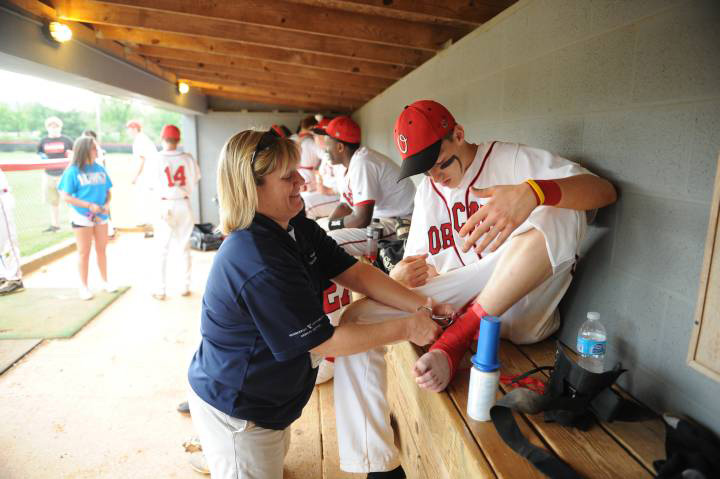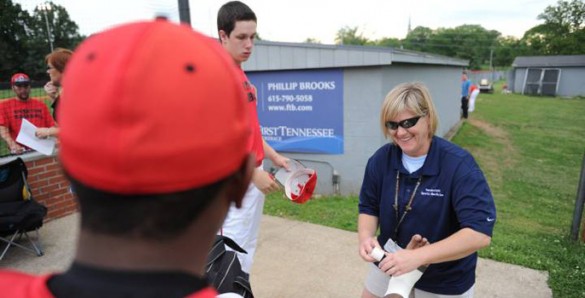Metropolitan Nashville Public Schools has joined with the Vanderbilt Center for Nashville Studies and Peabody College to create a platform to provide detailed, reliable and recurring information about the commitment of major employers to the public school system. This is the latest installment in a series that tells the story of collaborative involvement between members of the Vanderbilt community and local public schools.

For more than 20 years, Vanderbilt Sports Medicine has built a relationship with Metro Nashville Public Schools (MNPS) to ensure excellent care is provided to local athletes. Vanderbilt is now the official sports medicine provider to all 15 Metro high schools.
Vanderbilt Orthopaedics provides services to 28 schools in all, including every public high school in Davidson and Williamson counties, some local private schools and middle schools, and a variety of youth leagues. The partnership includes daily coverage of all athletic practices and competitions by certified athletic trainers and team physicians at no cost to the schools.
With local fall sports resuming practice, Vanderbilt physicians urge young athletes, coaches and parents to follow important safety tips related to injuries, hydration, heat and concussion. About 3.5 million injuries occur each year among U.S. children 14 and under playing sports. High school athletes suffer about 2 million injuries per year.

“Our goal is to keep these kids active and injury free so they can reap the rewards that come with playing sports—physical fitness as well as lessons in working together and how to achieve your goals and even picking yourself back up after a loss or mistake,” said Alex Diamond, assistant professor of pediatrics, orthopaedics and rehabilitation and medical director of the Program for Injury Prevention in Youth Sports (PIPYS) at Vanderbilt.
Diamond encourages all young athletes to have a pre-participation physical, a requirement for participants in Tennessee Secondary School Athletic Association (TSSAA) programs.
How to prevent sports injuries:
- Ensure that a pre-participation physical exam, meeting updated national recommendations, is performed, preferably by the athlete’s primary care physician.
- Provide appropriate periods for rest and recovery to prevent overuse injuries.
- Always wear the right protective equipment for your sport, such as pads, helmets, face guards and eyewear.
- Follow all safety rules of the sport in both practices and games.
How to avoid heat illness:
- Have water available at all times and drink regularly.
- Do conditioning in the early morning or late evening, when temperatures are coolest.
- Wear light-colored and loose-fitting clothing.
- Follow TSSAA heat guidelines, including no outside activity if the heat index is 104 degrees or higher.
- Slowly acclimate to hot, humid weather by starting with light practices and gradually increasing intensity the first one to two weeks of practice in hot, humid conditions.
- Eat a balanced meal before practice and drink plenty of fluids throughout the day.
How to stay hydrated:
- Twenty-four hours before activity, eat a balanced diet and drink plenty of fluids.
- One hour before, drink 8-16 ounces of water.
- During activity, drink 5-10 ounces every 15-20 minutes.
- Children weighing less than 90 pounds should take 10 gulps of water.
- Children weighing more than 90 pounds should take 20 gulps of water.
- After activity, drink 12-16 ounces for every pound of body weight lost during exercise, and complete the fluid replacement prior to the next practice session.
- Avoid caffeine.
What to do if you suspect a concussion:
- Remove the athlete from play. Follow the mantra “When in doubt, sit them out.”
- Do not let the athlete return to play, even if they insist they feel fine.
- Have the athlete evaluated by a health care professional experienced in evaluating concussions.
For more information, see PIPYS’ Guides for Injury Prevention and Safety.
All Metro students get free breakfast, lunch
When school starts Aug. 6, every student in Metro Schools will have access to a nutritious breakfast and lunch at no cost and with no application required.
The 2014-15 school year marks year one of a four-year commitment from the USDA and its Community Eligibility Provision program, which will reimburse the district for 100 percent of the cost of providing school meals for all students. District officials expect more students will take advantage of healthy meals, resulting in a ripple effect on academic achievement, student discipline and school culture.
Every lunch offering will be designed to be appealing to children and will include at least one serving each of fruit, vegetable, whole grain and dairy. Sodium, fat and calories will be regulated.
Director of Schools Jesse Register called the school meal partnership “a huge win for our families.”